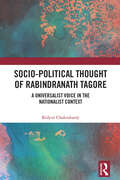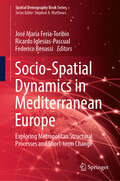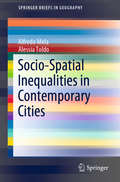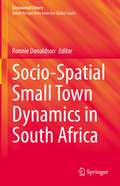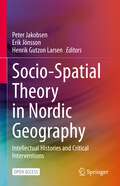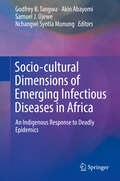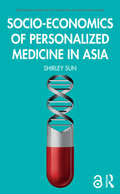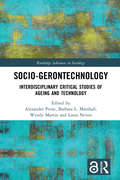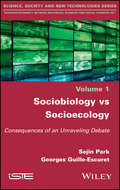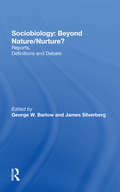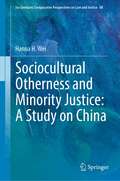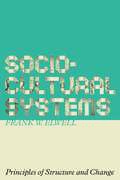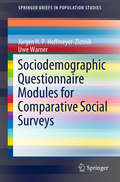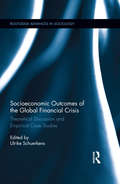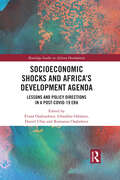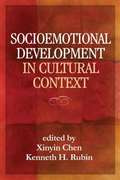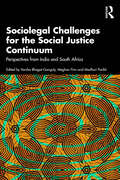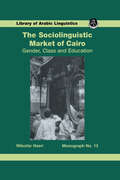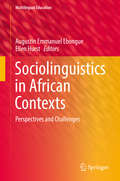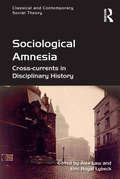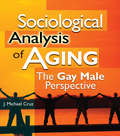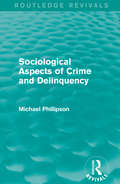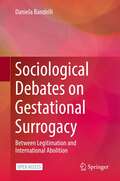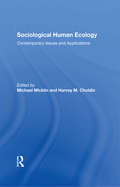- Table View
- List View
Socio-Political Thought of Rabindranath Tagore: A Universalist Voice in the Nationalist Context
by Bidyut ChakrabartyThis book is a political biography of Rabindranath Tagore. It identifies the principal threads in Tagore’s ideational universe and discusses them with reference to his written treatises. The book looks at the issues that made Tagore a thinker of visions and were complementary to the uplift of humanity regardless of race, religion and ethnicity. According to Tagore, religion, caste and gender were the major deterrents to the socio-cultural uniformity of contemporary India. He championed an ideational vision castigating those socio-cultural practices which impaired the coming together of human beings. The book also analyses his debate with Gandhi and the contestations around ideas of nation, industrialism and colonial exploitation.An important addition to the study of Tagore’s politico-ideological views, the volume will be of great interest to scholars and researchers of history, political science, literature, nationalism, sociology and South Asian studies.
Socio-Spatial Dynamics in Mediterranean Europe: Exploring Metropolitan Structural Processes and Short-term Change (Spatial Demography Book Series #3)
by José María Feria-Toribio Ricardo Iglesias-Pascual Federico BenassiThis book analyses the most recent socio-territorial trends that are developing in the Spanish metropolitan space. The first part focuses on the most recent metropolitan dynamics and demographic changes in Southern Europe. The second part discusses the most important processes in metropolitan areas: the problems of increasing social and residential vulnerability and the problems of diversity management. The third part analyses some concrete cases of the main changes and complexity in the spatial dynamics of metropolitan areas in Southern Europe. Finally, the fourth and last part provides an overview on the instruments and the resources put in place by some Southern European cities for the development of governance and citizen participation as an instrument of reaction to the social, economic and COVID crisis. By discussing the main changes and uncertainties derived from the social scenarios after the pandemic, the dynamics of social dualisation of the city, as well as the necessaryinstruments for its analysis and the main challenges in urban governance with special attention of Southern European context, this book provides an interesting read for spatial demographers, human geographers, social scientists and spatial planners.
Socio-Spatial Inequalities in Contemporary Cities (SpringerBriefs in Geography)
by Alfredo Mela Alessia ToldoThe book explores social inclusion/exclusion from a socio-spatial perspective, highlighting the active role that space assumes in shaping social phenomena. Unlike similar books, it does not discuss exclusion and inclusion in particular geographical contexts, but instead explains these phenomena starting from the dense and complex set of relationships that links society and space. It particularly focuses on social differences and how the processes of exclusion and inclusion can produce a highly spatialized understanding of them, for example when particular groups of people are perceived as being out of place.At the same time, within the context of the different approaches that policies adopt to contrast the phenomena of social exclusion, it examines the role of participation as an instrument to promote bottom-up inclusion and cohesion processes.
Socio-Spatial Small Town Dynamics in South Africa (GeoJournal Library)
by Ronnie DonaldsonThis book explores small town geographical aspects by approaching them from a socio-spatial perspective. The contributions included in this book delve into a range of topics that have not been commonly studied before, such as white privilege, neglect of municipal infrastructure, collaborative governance, livelihoods in small-scale fisheries, housing provision, well-being in mining towns, studentification in rural contexts, election trends, and the historical development of small-town spas. The book adopts a socio-spatial point of view, providing a holistic understanding of the interplay between social and spatial factors within selected small town case studies. This approach sheds light on the socio-economic, political, and cultural dynamics that shape small towns. This localized perspective allows for a more targeted analysis of issues and potential solutions, taking into account the specific historical, cultural, and political contexts of small town South Africa. The edited volume serves as a valuable resource for academics, policymakers, practitioners, and anyone interested in understanding and improving small towns in South Africa.
Socio-Spatial Theory in Nordic Geography: Intellectual Histories and Critical Interventions
by Henrik Gutzon Larsen Peter Jakobsen Erik JönssonThis open access book is about socio-spatial theory in, and the nature of, Nordic geography. From both historical and contemporary perspectives, the book engages with theorisations of geography in the Nordic countries. Including chapters by geographers from Denmark, Finland, Iceland, Norway and Sweden, it reflects how theories about the relations between the social and the spatial have been developed, adopted and critiqued in Nordic human geography in relation to a wide range of themes, concepts and approaches. The book also traces institutional developments, distinct geographical traditions and intellectual histories, as well as authors’ own experiences as geographers in and beyond the Nordic area. The chapters together introduce and engage with debates and discussions that permeate Nordic geography and allows readers a glimpse of geographical thinking and the role of socio-spatial theory in the Nordic countries. By providing insights into how geographical ideas emerge, travel and are translated and adapted in specific contexts, the book contributes to debates about historical-geographical situatedness and theorisations of geography.
Socio-cultural Dimensions of Emerging Infectious Diseases in Africa: An Indigenous Response to Deadly Epidemics
by Godfrey B. Tangwa Akin Abayomi Samuel J. Ujewe Nchangwi Syntia MunungThis volume examines the most important socio-cultural, political, economic, and policy issues related to emerging infectious diseases in Africa. The volume covers the work of the Global Emerging Pathogens Treatment Consortium (GET); it looks at the challenges of science education and communication in Africa, the global health and governance of pandemics and epidemics, and more. It looks beyond such threats as Ebola, SARS, and Zika to consider the ways communities have sought to contain these and other deadly pathogens. The chapters provide a better understanding of a global health problem from an African perspective, which help clarify to readers why some responses have worked while others have not. Overall, the volume captures the state of the art, science, preparedness, and evolution of a topic important to the health of Africa and the world. It has a broad appeal across disciplines, from medical science and biomedical research, through research ethics, regulation and governance, science and health communication, social sciences, and is also of interest to general readers.
Socio-economics of Personalized Medicine in Asia
by Shirley SunThe second decade of the twenty-first century has witnessed a surging interest in personalized medicine with the concomitant promise to enable more precise diagnosis and treatment of disease and illness, based upon an individual’s unique genetic makeup. In this book, my goal is to contribute to a growing body of literature on personalized medicine by tracing and analyzing how this field has blossomed in Asia. In so doing, I aim to illustrate how various social and economic forces shape the co-production of science and social order in global contexts. This book shows that there are inextricable transnational linkages between developing and developed countries and also provides a theoretically guided and empirically grounded understanding of the formation and usage of particular racial and ethnic human taxonomies in local, national and transnational settings.
Socio-gerontechnology: Interdisciplinary Critical Studies of Ageing and Technology (Routledge Advances in Sociology)
by Alexander PeineSocial change in the twenty-first century is shaped by both demographic changes associated with ageing societies and significant technological change and development. Outlining the basic principles of a new academic field, Socio-gerontechnology, this book explores common conceptual, theoretical and methodological ideas that become visible in the critical scholarship on ageing and technology at the intersection of Age Studies and Science and Technology Studies (STS).Comprised of 15 original chapters, three commentaries and an afterword, the book explores how ageing and technology are already interconnected and constantly being intertwined in Western societies. Topics addressed cover a broad variety of socio-material domains, including care robots, the use of social media, ageing-in-place technologies, the performativity of user involvement and public consultations, dementia care and many others. Together, they provide a unique understanding of ageing and technology from a social sciences and humanities perspective and contribute to the development of new ontologies, methodologies and theories that might serve as both critique of and inspiration for policy and design.International in scope, including contributions from the United Kingdom, Canada, the United States, Australia, Germany, Norway, Denmark, Austria, the Netherlands, Spain and Sweden, Socio-gerontechnology is an agenda-setting text that will provide an introduction for students and early career researchers as well as for more established scholars who are interested in ageing and technology. Chapters 3, 5, and 15 of this book are freely available as downloadable Open Access PDFs at http://www.taylorfrancis.com under a Creative Commons Attribution-Non Commercial-No Derivatives (CC-BY-NC-ND) 4.0 license.
Sociobiology
by Edward O. WilsonView a collection of videos on Professor Wilson entitled "On the Relation of Science and the Humanities"
Sociobiology vs Socioecology: Consequences of an Unraveling Debate
by Georges Guille-Escuret Sejin ParkAs a theory, sociobiology is opposed to socio-ecology, a discipline hampered since its birth. The indictment of the ideological intentions of the first has obscured the notion that the growing domination of the image of the “selfish gene” has obstructed the necessary rise of the second. For 40 years, a terrible force of inertia has thus frozen the global analysis of socio-ecological interactions outside the theoretical bias externally imposed on social sciences by so-called “behavioral ecology”, which amounts to a simple emanation of sociobiology. This book summarizes the methodological abuses and the illusory legitimations of a school whose sterility can no longer be concealed, but which is preparing to reinvent itself by cynically replacing its faltering laws by hijacking the recent advances in epigenetics. The authors shed light on unjustly sacrificed paths in the study of socio-ecological interactions.
Sociobiology: Reports, Definitions And Debate
by George W Barlow James Silverberg Frank B LivingstoneTo most biologists, sociobiology represents the concept of strict Darwinian individual selection married to an analytical application of ecological principles and brought to bear on social behavior in an unusually exciting and productive way. Joining the biologists are a small number of social scientists. But there are radically divergent views as to how the field should be delimited, and sociobiology is one of the most widely discussed fields in biology and anthropology today. The symposium on which this book is based was arranged by a biologist and an anthropologist. The participants, leaders in their fields, ably present contrasting and responsible views on current issues. This is the first collection of essays on sociobiology in which opposing views are aired. It is an exciting, timely book and an important historical document.
Sociocultural Otherness and Minority Justice: A Study on China (Ius Gentium: Comparative Perspectives on Law and Justice #88)
by Hanna H. WeiThis book draws attention to the nonlegal, sociocultural aspects of justice for minorities in China. The primary objectives are threefold. The first is to present a tentative analysis of the lived realities of being ‘the other’ in China, with the aim of presenting a critical picture of the complex national context and identifying main concerns and key challenges. Six topics are covered - gender roles, health, class, intimacy, ethnicity and religion, and expression. The second objective is to explore the interaction between a wide range of factors and myriad systems that enable or hinder protection and justice for these groups, be they historical, political, social, or cultural, hoping to open up a rich domain of inquiry for those interested in to what extent and in what ways otherness may or may not survive in China. The third objective is to bring attention to new trends and developments, some are easily identifiable whereas others are less detectable, some are interrelated while others are relatively isolated, some are straightforward and others remain easily misinterpreted.
Sociocultural Systems: Principles of Structure and Change
by Frank W. ElwellMacrosociology—the study of large-scale social structures and the fundamental principles of social organization—was the style of sociology practiced by the founders of the discipline. Today, the social theories of Karl Marx, Max Weber, Émile Durkheim, and Herbert Spencer (among others) are commonly studied as part of the history of the field, but, although the macrosociological approach that these thinkers advocated is still employed, it no longer dominates the discipline. Instead, sociologists typically adopt a narrower focus, specializing in areas such as social psychology, medicine, religion, or the study of social stratification. Examining the bigger picture is a task often left to public intellectuals. Sociocultural Systems aims to reinstate macrosciology as the heart of the discipline by demonstrating that both classical and contemporary macrosociologists stand upon common ground. Focusing on the broad issues that concerned the founders, Elwell addresses questions such as: Historically, what factors accounted for the origin, survival, and evolution of sociocultural systems? Why were some societies more technologically advanced than others? What is the origin of capitalism? What factors determine the allocation of goods and services within and among societies? What effects do changes in government and economic institutions have on communities? Elwell argues that, as evolution does for biology, the macrosociological paradigm offers an analytical strategy that can be used both to guide and prioritize research in all of the myriad specialties within sociology and to lay forth an orderly body of knowledge for students. Clearly articulating important sociological principles, Sociocultural Systems provides a critical understanding of social institutions and issues, while also furnishing a framework for possible solutions to the perennial social crises that are part and parcel of the development of human societies.
Sociodemographic Questionnaire Modules for Comparative Social Surveys (SpringerBriefs in Population Studies)
by Uwe Warner Jürgen H.P. Hoffmeyer-ZlotnikAbove all, this book focuses on the application of sociodemographic survey questions. Based on theoretical foundations, it addresses the operationalization of variables and presents socio-demographic questionnaire modules for within- and across-country comparative survey research. The book pursues three main objectives: to provide a thorough and comprehensive overview of the survey instruments currently available for the measurement of sociodemographic variables in cross-national comparative research; to offer the reader a set of harmonized international demographic standards; and to show how these standards can be implemented by the various parties involved in international comparative surveys – from the central project coordinators, to the researchers on the national survey teams, to the fieldwork agencies and their interviewers, to respondents, and eventually, to the data processing experts preparing the datasets for comparative analysis. The book offers a valuable resource for researchers, practitioners and students actively involved in producing and analyzing sociodemographic survey data. The typical readers will be social science researchers, qualified consultants and professionals interested in the field of (comparative) survey research. The book can also serve as a useful supplement to introductory textbooks on survey methodology and is suitable for Bachelor and Master students of the social sciences.
Socioeconomic Outcomes of the Global Financial Crisis: Theoretical Discussion and Empirical Case Studies (Routledge Advances in Sociology)
by Ulrike SchuerkensThis book originates from a comparative research project involving extensive collection and analysis of primary and secondary materials (scholarly literature, statistical data, and interviews with key actors) on socioeconomic outcomes of the global financial crisis in all major world regions during the last years. Offering analytical and comparative insights at the global level, as well as an assessment of the overall social globalization phenomenon, this book will be useful for scholars, students, NGOs, and policy makers.
Socioeconomic Shocks and Africa’s Development Agenda: Lessons and Policy Directions in a Post-COVID-19 Era (Routledge Studies in African Development)
by Gbadebo Odularu Evans Osabuohien Daniel Ufua Romanus OsabohienThis book investigates how African countries respond to socioeconomic shocks, drawing out lessons to help to inform future policy and development efforts. The challenges posed by the COVID-19 pandemic affected all sectors of the economy, exposing substantial structural weaknesses and complexities in supply chains and logistics across the African continent. This book examines the disruptive impact of the pandemic across Africa. However, it also goes beyond the current crisis to investigate how socioeconomic pressures in general impact commodity prices, national budgeting processes, food, business, energy sectors, education, health, and sanitation. Overall, the book presents evidence-based solutions and policy recommendations to enable readers to improve resilience and responses to future crises. The insights provided by this book will be of interest to policymakers and development agencies, as well as to researchers of global development, politics, economics, business, and African studies.
Socioemotional Development in Cultural Context
by Kenneth Rubin Xinyin ChenFilling a significant gap in the literature, this book examines the impact of culture on the social behaviors, emotions, and relationships of children around the world. It also explores cultural differences in what is seen as adaptive or maladaptive development. Eminent scholars discuss major theoretical perspectives on culture and development and present cutting-edge research findings. The volume addresses key aspects of socioemotional functioning, including emotional expressivity, parent-child and peer relationships, autonomy, self-regulation, intergroup attitudes, and aggression. Implications for culturally informed intervention and prevention are highlighted
Sociolegal Challenges for the Social Justice Continuum: Perspectives from India and South Africa
by Varsha Bhagat-Ganguly Meghan Finn Madhuri ParikhAs legal jurisdictions in the Global South, both India and South Africa have long histories of inequality and structural oppression. This book engages in comparative sociolegal analysis to examine the contours of social justice in both countries. It explores the role of law as an instrument for social change in the face of persistent conditions of injustice, discrimination, social exclusion, and socioeconomic vulnerabilities. The book addresses newly emerging socio-legal challenges for the social justice continuum in a neoliberal era. Focusing on four key themes, it explores:· the challenges for labour law and social security including informalisation, climate change, and migrancy;· law, technology, and social justice, with a focus on the role that emerging technologies often play to ameliorate or exacerbate social exclusion;· sexual orientation, gender, and substantive equality, grappling with the disjuncture between law and lived realities; and· pedagogical approaches to legal education and social justice lawyering.Lucid and illuminating, this book will be of interest to academics, researchers, legal practitioners and social actors who are exploring legal strategies and developments to tackle comparative social justice challenges, especially in the Global South.
Sociolinguistic Market Of Cairo: Gender, Class And Education
by Niloofar HaeriFirst published in 1997. The field of Arabic sociolinguistics has made rapid strides since the appearance of the first correlation studies in the early 1980s. Up to that point, studies of non-standard Arabic had largely been confined to the field of dialectology, in which the researcher's frame erred on the historical or cultural. Dr. Haeri's work falls into the Labovian sociolinguistic paradigm, with the edition of the awareness of the local social backdrop in her linguistic investigations and how this needs to be integrated into any correlation work, and also being area of the general Arab sociolinguistic frame of reference of which the situation in Cairo forms a part.
Sociolinguistics in African Contexts
by Augustin Emmanuel Ebongue Ellen HurstThis volume offers a new perspective on sociolinguistics in Africa. Eschewing the traditional approach which looks at the interaction between European and African languages in the wake of colonialism, this book turns its focus to the social dynamics of African languages and African societies. Divided into two sections, the book offers insight into the crucial topics such as: language vitality and endangerment, the birth of 'new languages', a sociolinguistics of the city, language contact and language politics. It spans the continent from Algeria to South Africa, Guinea-Bissau to Kenya and addresses the following broad themes: Language variation, contact and change The dynamics of urban, rural and youth languages Policy and practice This book provides an alternative to the Eurocentric view of sociolinguistic dynamics in Africa, and will make an ideal read or supplemental textbook for scholars and students in the field/disciplines of African languages and linguistics, and those interested in southern theory or 'sociolinguistics in the margins'.
Sociological Amnesia: Cross-currents in Disciplinary History (Classical and Contemporary Social Theory)
by Alex Law Eric Royal LybeckThe history of sociology overwhelmingly focuses on 'the winners' from the classical 'canon' - Marx, Durkheim, and Weber - to today's most celebrated sociologists. This book strikingly demonstrates that restricting sociology in this way impoverishes it as a form of historically reflexive knowledge and obscures the processes and struggles of sociology's own making as a form of disciplinary knowledge. Sociological Amnesia focuses on singular contributions to sociology that were once considered central to the discipline but are today largely neglected. Chapters explore the work of illustrious predecessors such as Raymond Aron, Erich Fromm and G.D.H. Cole as well as examining exceptional cases of reputational revival as in the case of Norbert Elias or Gabriel Tarde. Through understanding the obstacles of recognition faced by female sociologists like Viola Klein and Olive Schreiner, and public intellectuals like Cornelius Castoriadis, the volume considers the reasons why certain kinds of sociology are hailed as central to the discipline, whilst others are forgotten. In so doing, the collection offers fresh insights into not only the work of individual sociologists, but also into the discipline of sociology itself - its trajectories, forgotten promises, and dead ends.
Sociological Analysis of Aging: The Gay Male Perspective
by Joe Michael CruzSociological Analysis of Aging: The Gay Male Perspective is an exploratory study of the life changes homosexual and bisexual men experience as they age. This unique book presents in-depth, qualitative interviews with gay men, aged 55 and older, focusing on their physical, mental, and social needs. More than one hundred men offer first-hand perceptions on the unique problems they face with regards to employment/retirement, housing, health and well-being, and relationships, and how they function within (or without) a social support system. Sociological Analysis of Aging fills in the gaps in the existing social science literature on homosexuals and aging, updating findings that were inconclusive when first published and/or based on case studies or limited samples. While standard books on aging typically deal with the impact of life events such as child rearing, the empty nest syndrome, and grandparenting, Sociological Analysis of Aging deals with the unique realities that gay men face in addition to the universal concerns of the elderly: affordable health care, affordable housing, and adequate coverage for medication costs. The study examines what can be done to assist "successful" aging for sexual minorities, particularly in the areas of social policy, service delivery, and public tolerance. Sociological Analysis of Aging focuses on specific research questions: Do aging gay men consider themselves to be physically healthy? Do aging gay men suffer from depression? Do aging gay men have access to social support networks? What are the housing needs of the aging gay community-present and future? How involved are aging gay men with family, friends, church, and community? In addition, the men interviewed were asked what, if anything, was left on a "to-do" list; what the best and worst aspects of aging are; and what, if anything, they would change about the course their lives had taken. Their answers make Sociological Analysis of Aging: The Gay Male Perspective an essential resource for therapists, counselors, and social workers, and for academics working in sociology, psychology, gerontology, and gay studies.
Sociological Aspects of Crime and Delinquency (Routledge Revivals)
by Michael PhillipsonThe field of crime and delinquency attracts a great deal of heated and partial opinion, prejudice and other forms of mal-thinking. When there is a scientific approach there tends to be a psychological explanation. This book, first published in 1971, is a corrective to both trends. It is a discussion of criminal behaviour in relation to a wide range of behaviours which could be called deviance and regards the whole field from the sociological point of view. The whole discussion is related to social policy, and is vital reading for students of sociology and criminology.
Sociological Debates on Gestational Surrogacy: Between Legitimation and International Abolition
by Daniela BandelliThis open access book discusses and analyses competing views and social implications of gestational surrogacy, which is making inroads as an option for parenthood as well as a work opportunity for women. It provides a rich account of transnational mobilizations for the abolition and regulation of surrogacy, with focus on United States, Italy and Mexico. The author critically assesses the core narratives of supporters and opponents of surrogacy, in order to understand this reproductive practice in light of some of the essential elements of contemporary societies, such as the “child at any cost” culture, individualism, technology and female emancipation. This book appeals to scholars, policy makers and all those who want to understand the controversial debate on this unprecedented method of family formation and life production.
Sociological Human Ecology: Contemporary Issues And Applications (The\springer Series On Demographic Methods And Population Analysis Ser.)
by Michael Micklin Harvey M CholdinFirst published in This volume grew out of concerns raised by the contributors and a few others over the current status of human ecology within the field of sociology. Stemming from conferences and subsequent discussions by a group of sociologist-demographers on recent developments in sociological human ecology which started at the annual meeting of the Population Association of America in 1976, the original essays contained in this book are designed to review and assess the current state of knowledge in the field.
